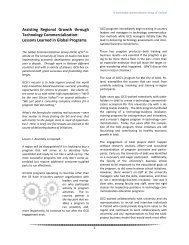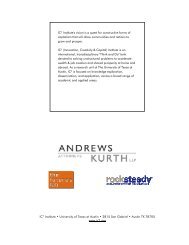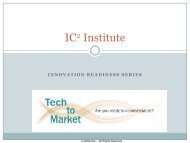“Quicklook” Assessment of Greater Adelaide's Assets & Challenges ...
“Quicklook” Assessment of Greater Adelaide's Assets & Challenges ...
“Quicklook” Assessment of Greater Adelaide's Assets & Challenges ...
You also want an ePaper? Increase the reach of your titles
YUMPU automatically turns print PDFs into web optimized ePapers that Google loves.
previous Friday trading. A student run School Shop Committee decides how the pr<strong>of</strong>its<br />
are spent.<br />
The Mypolonga Primary School Shop has evolved into a venture that very positively<br />
impacts on the curriculum and the whole culture <strong>of</strong> the school. It has been a catalyst for<br />
the development <strong>of</strong> genuine school-community partnerships. The Shop has links to all<br />
aspects <strong>of</strong> the school’s curriculum. Examples include:<br />
• English – writing reports, brochures, video scripts, letters, oral communication<br />
• Mathematics – commission calculations, sales calculations, pricing, measurement<br />
• Technology – spreadsheets, computing, displays, video production, badge and<br />
magnet making<br />
Facilitators<br />
National and State Policy<br />
• In SA, public education is viewed as being a change agent in regards to<br />
information technology.<br />
• In regard to information technology for the school system, the internal structure <strong>of</strong><br />
development has three major areas <strong>of</strong> emphasis:<br />
o Expect<br />
An Annual Report that compares goals and achievements<br />
o Influence<br />
Various mentoring programs<br />
o Inspire<br />
Bring others onto the “train”<br />
Technology School <strong>of</strong> the Future<br />
• There is a national charge for all <strong>of</strong> the Australian states to focus on implementing<br />
specific information technology standards centered on online education, people, and<br />
infrastructure.<br />
• A major new curriculum initiative is about to be introduced into the South Australia<br />
school system (SACSA). This curriculum is intended to be customer oriented, both<br />
individual and community based. In theory this new curriculum is an integrated<br />
learning continuum from kindergarten through year 12 with learning assessment<br />
along the way.<br />
Business Oriented Processes and Entrepreneurial Approaches<br />
• Various Entrepreneurial programs are being developed at Adelaide University and<br />
University <strong>of</strong> South Australia. For example, Adelaide University initiated a Masters <strong>of</strong><br />
Science and Technology Commercialization degree program in 1999.<br />
• A variety <strong>of</strong> current initiatives to improve ICT competencies and information<br />
economy literacy for both students and faculty for K-12 schools.<br />
o Industry competency standards are being directly used to build student<br />
skill set requirements. Beginning in 2001 an implementation <strong>of</strong> strategies<br />
focusing on benchmarking ICT competencies using a three-phase<br />
approach was introduced. This addresses competencies from early<br />
childhood to senior secondary. Extensive industry consultation was used<br />
to develop this strategy. For example, by the end <strong>of</strong> year 10 all students<br />
will achieve an industry accredited ICT qualification visa Information<br />
Industry Training Advisory Body (IITAB) National Training Package IT<br />
Certificate I.<br />
o Examples <strong>of</strong> initiatives for teacher competency include the discovery<br />
program. The Learning Technologies Project <strong>of</strong>fers a program <strong>of</strong> leading<br />
COMMERCIAL IN CONFIDENCE<br />
68





